 Petzlover
PetzloverIrish Water Spaniel is originated from Ireland but Other is originated from United States. Irish Water Spaniel may grow 31 cm / 12 inches shorter than Other. Irish Water Spaniel may weigh 87 kg / 191 pounds lesser than Other. Irish Water Spaniel may live 8 years less than Other. Both Irish Water Spaniel and Other has almost same litter size. Irish Water Spaniel requires Moderate Maintenance. But Other requires Low Maintenance
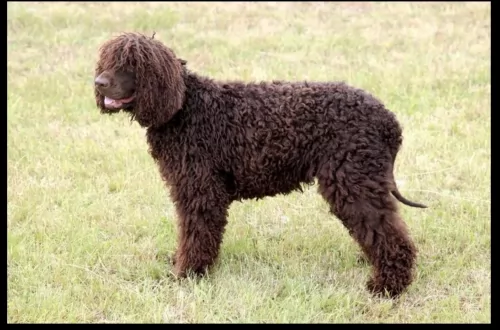 The Irish Water Spaniel is one of the larger spaniel types and also one of the oldest.
The Irish Water Spaniel is one of the larger spaniel types and also one of the oldest.
He is sometimes referred to as the Southern Irish Water Spaniel. Hailing from Ireland, the precise origins of the dog aren't altogether sure. It is believed that the dog came from other dogs from Persia and there are references to these water dogs from as early as 1600.
The modern breed was developed in Ireland in the 1830s. The breed's purpose is that of a hunter of waterfowl and he swims strongly.
The Irish Water Spaniel was recognized by the AKC in 1884. In 1890 the Irish Water Spaniel Club was formed.
Dog lovers are thrilled because there is such diversity to choose from when looking for a pet.
There are so many other dogs that don’t have any particular breed name, and these can be tiny dogs or massive dogs that you would have to think twice about before buying one, as a large dog can eat you out of hearth and home.
All dogs, pedigreed or other, have descended from the wolf but it is unsure about when dogs were actually domesticated. One thing is sure, it is amazing to think that dogs descended from wolves but that you get so many varieties to day – different sizes, different coat colors and lengths, some have erect ears, others floppy, some are lean and mean and others muscular and heavily-set. They have all originated from different parts of the world.
There are well over 100 different pure dog breeds as well as plenty of other dogs. In fact you can create many different dogs by breeding certain of them to get the looks and characteristics you want.
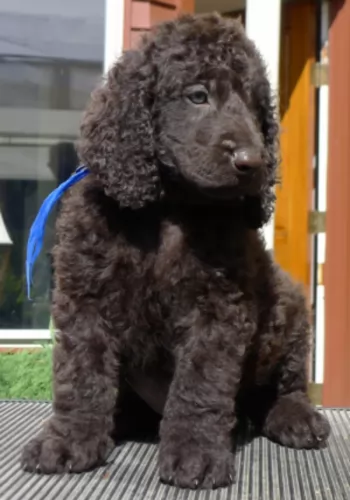 A peculiar feature of this dog is its hairless tail which is partly covered in curls which the rest is all but hairless, giving him the nickname of Rat Tail or Whip Tail.
A peculiar feature of this dog is its hairless tail which is partly covered in curls which the rest is all but hairless, giving him the nickname of Rat Tail or Whip Tail.
Looking much like a Poodle with his tight oily curls, the Irish Water Spaniel is a medium to large sized purebred dog, a robust, compact built dog with a skull which is shaped like a dome.
The muzzle is longish, the eyes dark brown and intelligent looking and the ears are long and floppy.
His hair is thick and curly and it sheds very little so that the dog is regarded as being hypoallergenic. The medium length coat is a dark brown, liver color with fairly tight curls that may even tend to cover the eyes.
It is interesting to note that he has webbed feet, which is useful for when the dog swims.He stands at roughly 51cm to 61cm and weighs between 25 to 30kg.
Temperament in any dog is affected by socialization and the way the human owner raises the dog. The Irish Water Spaniel is a water loving dog, being active and energetic.
He is an intelligent dog and easy to train and socialize. When trained he becomes such an obedient dog. He has also got a light-hearted side to him and is actually known to be quite amusing and clownish, providing plenty of laughs for you.
They make good family dogs, getting on well with children in the home as well as with other pets. They're also able to make good guard dogs, taking the protective roles seriously. He isn't an aggressive dog but he has a warning bark that can be a good warning to intruders.
Dogs today come with so many looks. ‘Other’ dogs are vast and varied. They may be pedigreed dogs that are ‘off the radar’ or they may be among the many ‘cross-breed’ dogs there are.
You can get a tiny Chihuahua, measuring just 9cm in height, but you can also get a huge dog like the Great Dane that can stand at up to 90cm in height. It isn't however, a heavily built dog like the giant Newfoundland which can weigh up to 117 kg or so.
Some dogs are intelligent, others not so much. Others are social and others more reserved. Some won’t be able to tolerate being cooped up indoors and not being able to be outdoors involved in an activity, while others are more indoor dogs.
Some dog are friendly, others indifferent, some boisterous and sporty, others docile and lazy. There are so many other dogs that don’t make the pedigreed list, but they’re adored by their human family for being so utterly unique.
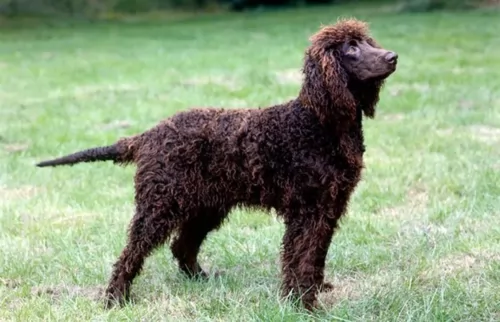 Your active Irish Water Spaniel just loves water so you can count him in whenever you go swimming. That is one characteristic of the Irish Water Spaniel – he just loves to be involved in all the action you're busy with.
Your active Irish Water Spaniel just loves water so you can count him in whenever you go swimming. That is one characteristic of the Irish Water Spaniel – he just loves to be involved in all the action you're busy with.
He makes an ideal family pet for an active family, and he will be a loyal and devoted pet who will provide a lot of fun to your family with his mischievous side.
He is confident, independent and strong willed so first time dog owners should bear this in mind. He is essentially just a fun loving, busy dog and if you make sure to exercise him well and make sure he is a participating member of your family, he'll be your most loving and devoted friend.
There are so many dogs, some are pedigree dogs and some aren’t. Some dogs are registered with kennel clubs and others aren’t.
Every dog has some amazing characteristics that make them so adorable. These kennel clubs divide dogs into categories such as Terriers, working dogs, herding dogs, toy breeds, hounds and so on. Pedigree breeds belong to these groups.
Other dogs are just as special, even if they don’t fall into the many dog breeds recognized by major kennel clubs.
There are so many other dog breeds, and if you want to bring some canine magic into your home and heart, apart from the very many expensive dog breeds out there, there are other dogs.
These are hybrids or true one-of-a-kind pavement specials that come at a fraction of the price but with the most amazing and wonderful characteristics you can imagine and which will make a most splendid pet.
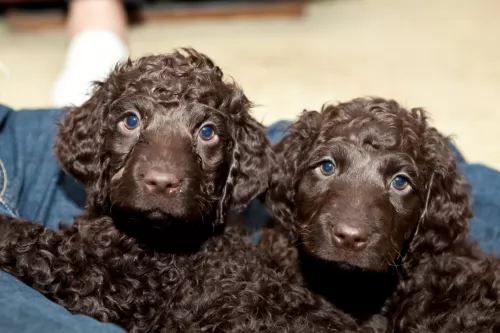 A generally healthy breed, the Irish Water Spaniel, just like with most other dogs, can fall prey to some of the more common dog ailments of which hip dysplasia is one.
A generally healthy breed, the Irish Water Spaniel, just like with most other dogs, can fall prey to some of the more common dog ailments of which hip dysplasia is one.
Bone and joint problems like this can lead to lameness even in young dogs.
Eye diseases are also a problem, and cataracts can form in the eye, particularly when the dog is older and create a cloudy look to the eye. It's not painful for the dog.
Hypothyroidism, a treatable hormonal disorder is another disease worth being aware of.
Other dogs are considered somewhat healthier than purebred dogs because they come from a broader gene pool. Nonetheless you still need to be aware of certain dog illnesses that your dog can develop -
This is a common ailment in dogs, and skin allergies can cause your dog a lot of discomfort and pain. They lick and lick and aggravate the situation. Sometimes fleas, chemicals and dog shampoos can aggravate the skin too. There are several things to look at – from making environmental changes to changing your dog’s food.
Cancer is common in dogs, just as in human beings, with there being a number of different cancers. Whenever you brush your dog, run your hands over him to check if there are any unusual lumps on him and have them examined if you do discover a lump.
Other dog illnesses to watch out for include bloat, ear and eye infections, cataracts, hip dysplasia and obesity, among others.
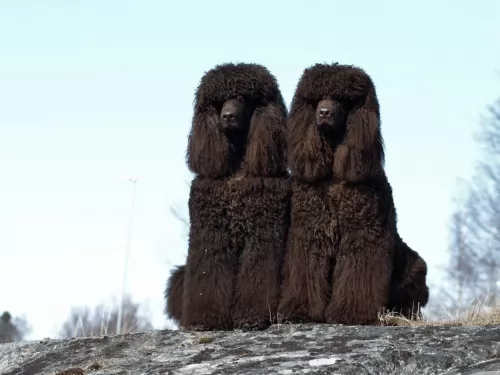 Your Irish Water Spaniel requires quite a bit of grooming that will involve his coat, his nails, his teeth and his ears. The double coat doesn't shed much so it can be easily maintained by brushing the coat twice a week.
Your Irish Water Spaniel requires quite a bit of grooming that will involve his coat, his nails, his teeth and his ears. The double coat doesn't shed much so it can be easily maintained by brushing the coat twice a week.
It can help your water spaniel to look good by sending him in to a doggy grooming parlor to have his curls neatened. This is a dog that loves water and swimming, and you will need to check the inside of his ears for dampness, wax build-up and debris. This can all combine to cause nasty ear infections.
The dog is energetic and will need to be exercised. Take him for walks, play ball games with him and allow him to go on hikes with you or to go swimming. He loves being involved in all your activities as he is a social, active dog.
Highly energetic, it will be important to feed your Irish Water Spaniel with food that enhances his energy levels. There are some good quality commercially manufactured dog foods on the market. Choose one that caters for active, athletic dogs such as the Irish Water Spaniel.
Dry kibble is more recommended to prevent canine tooth decay. Mix in some home cooked foods from time to time such as cooked chicken, rice, pasta and vegetables and try to include some raw meat every now and then as well. Make sure he has constant access to fresh, cool water.
Responsible dog owners know that their dogs require adequate food and water, lots of love and attention, exercise, a warm, dry bed, shelter from the elements when outdoors and medical attention when they’re sick.
One advantage with other dogs which aren’t pedigreed, is that by their very nature, they have good genetic diversity, and this means good overall health. Other dogs breeds are generally cheaper to buy and cheaper in terms of vet’s fees as they tend to be healthier.
Other dogs have a variety of different coat types, so whatever dog you have, you’ll need to be looking at brushing him, stripping him or having him professionally clipped. Whether erect or floppy ears, check inside for infection. The eyes will also need to be checked for infection and other eye ailments. All dogs will also have to have their nails clipped.
The size of all dogs, pedigree or other will determine the amount of food you give him. Big or small, pedigreed or other, every dog wants the same when it comes to diet. They want food which is nutritious, tasty and simple. They want a high quality commercially manufactured food high in minerals and vitamins.
They will benefit from some raw meat added into the kibble whenever its possible. They will also require some home-made food – simple, uncomplicated homemade food such as boiled chicken, brown rice or pasta and vegetables such as sweet potato, carrots and spinach. Such a diet will keep your pet free from digestive problems. Make sure he has a constant supply of cool, fresh water.
Exercise is important for every dog, but some dogs will require more exercise than others. Some dogs will be content with a walk every day while others will require far more – running beside you while you cycle, swimming, a run in the park, rope- and ball games and going with you on hikes.
Exercise is both entertaining for your dog and healthy too.